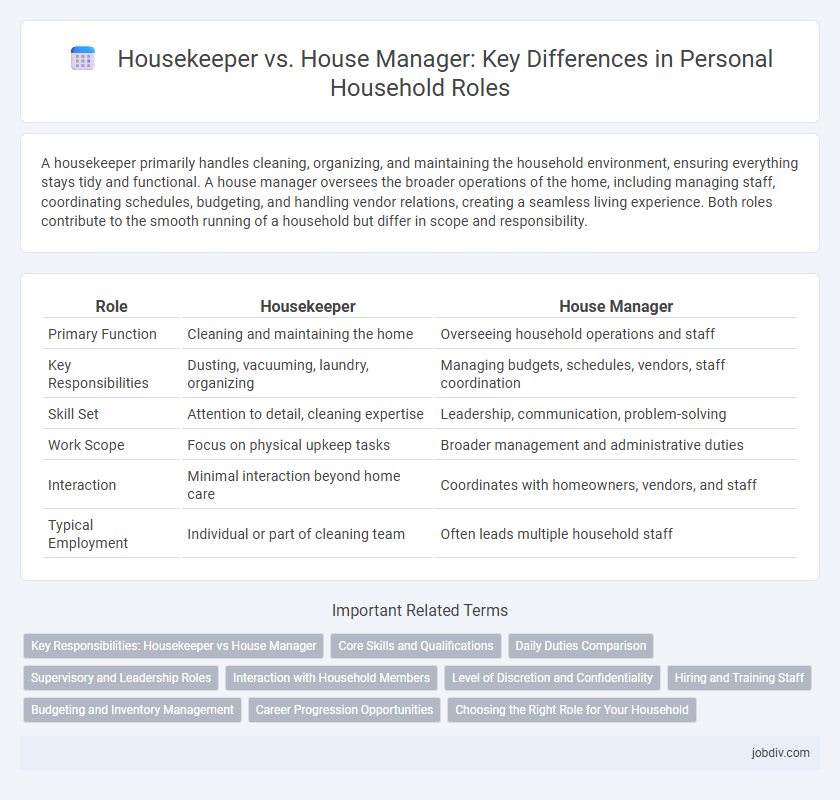A housekeeper primarily handles cleaning, organizing, and maintaining the household environment, ensuring everything stays tidy and functional. A house manager oversees the broader operations of the home, including managing staff, coordinating schedules, budgeting, and handling vendor relations, creating a seamless living experience. Both roles contribute to the smooth running of a household but differ in scope and responsibility.
Table of Comparison
| Role | Housekeeper | House Manager |
|---|---|---|
| Primary Function | Cleaning and maintaining the home | Overseeing household operations and staff |
| Key Responsibilities | Dusting, vacuuming, laundry, organizing | Managing budgets, schedules, vendors, staff coordination |
| Skill Set | Attention to detail, cleaning expertise | Leadership, communication, problem-solving |
| Work Scope | Focus on physical upkeep tasks | Broader management and administrative duties |
| Interaction | Minimal interaction beyond home care | Coordinates with homeowners, vendors, and staff |
| Typical Employment | Individual or part of cleaning team | Often leads multiple household staff |
Key Responsibilities: Housekeeper vs House Manager
Housekeepers focus on maintaining cleanliness, laundry, and basic household chores, ensuring the home stays tidy and organized. House Managers oversee household operations, coordinating staff, managing budgets, scheduling maintenance, and handling vendor relationships. The house manager's role requires leadership and administrative skills, while housekeepers provide hands-on domestic support.
Core Skills and Qualifications
Housekeepers excel in detailed cleaning, laundry, and basic home maintenance, requiring skills in organization, time management, and attention to cleanliness standards. House Managers possess broader expertise including staff supervision, budget management, vendor coordination, and event planning, demanding strong leadership, communication, and organizational abilities. Both roles benefit from reliability and discretion, but house managers often need experience in household administration and advanced problem-solving skills.
Daily Duties Comparison
Housekeepers primarily handle routine cleaning tasks such as vacuuming, dusting, laundry, and organizing living spaces to maintain a clean and orderly home environment. House managers oversee household operations beyond cleaning, including scheduling maintenance, managing staff, coordinating events, and handling budgets to ensure smooth daily functioning. The house manager's role encompasses strategic planning and staff supervision, whereas housekeepers focus on execution of detailed cleaning tasks.
Supervisory and Leadership Roles
Housekeepers primarily focus on executing cleaning and maintenance tasks, while house managers oversee household operations, including supervising staff and coordinating schedules. House managers assume leadership roles by managing budgets, hiring personnel, and ensuring efficient workflow among team members. Effective house management requires strong organizational skills and the ability to lead diverse staff, distinguishing it significantly from the more task-oriented role of housekeeping.
Interaction with Household Members
Housekeepers primarily focus on cleaning, organizing, and maintaining household order, with limited interaction mostly during task coordination. House managers engage deeply with household members, overseeing daily operations and ensuring their preferences and needs are met efficiently. Their role often involves clear communication, problem-solving, and managing schedules to enhance household functionality and comfort.
Level of Discretion and Confidentiality
Housekeepers primarily handle routine cleaning and maintenance tasks with limited access to sensitive household information, reflecting a lower level of discretion and confidentiality. House Managers oversee household operations, including staff coordination and financial management, requiring a higher degree of trust and responsibility in handling confidential matters. The role of a House Manager demands thorough discretion due to involvement in personal schedules, security, and private family affairs.
Hiring and Training Staff
Hiring a housekeeper typically involves selecting candidates with skills in cleaning, organization, and time management, while a house manager requires expertise in supervising staff, scheduling, and handling household logistics. Training for housekeepers often centers on efficient cleaning techniques and maintaining household standards, whereas house managers receive comprehensive training in team leadership, conflict resolution, and property management. Effective hiring and training strategies enhance overall household operations and ensure high performance across roles.
Budgeting and Inventory Management
Housekeepers primarily handle routine cleaning tasks, but house managers oversee budgeting and inventory management to ensure household supplies and services are purchased efficiently. House managers track expenses, negotiate with vendors, and maintain detailed inventory records to optimize resource allocation. This financial oversight distinguishes house managers by providing structured control over household spending and stock levels.
Career Progression Opportunities
Housekeepers often begin with foundational cleaning and maintenance tasks, gaining valuable hands-on experience that can lead to supervisory roles or specialized cleaning positions. House Managers oversee comprehensive household operations, including staff coordination, budgeting, and event planning, which opens pathways to executive roles in luxury estate management or hospitality services. Advancing from housekeeper to house manager involves acquiring management skills, financial acumen, and a broader understanding of household logistics, significantly enhancing career progression opportunities.
Choosing the Right Role for Your Household
Selecting the right role for your household depends on the specific needs and complexity of your home management. A housekeeper primarily focuses on cleaning, laundry, and basic maintenance tasks to maintain household cleanliness and order. A house manager oversees a broader range of responsibilities, including staff supervision, budgeting, scheduling, and coordinating services to ensure smooth household operations.
Housekeeper vs House Manager Infographic

 jobdiv.com
jobdiv.com